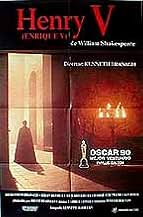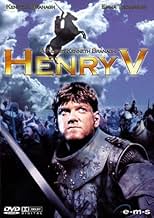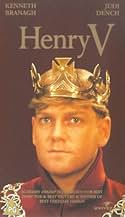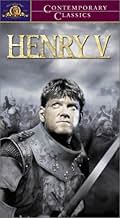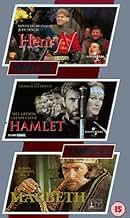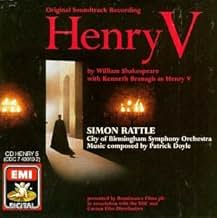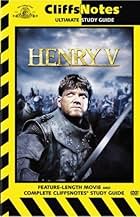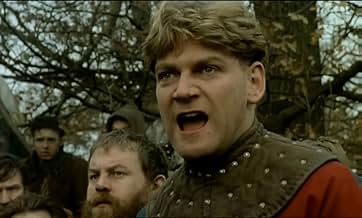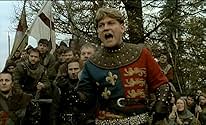Henry V
- 1989
- Tous publics
- 2h 17min
En plein coeur de la Guerre de Cent Ans, le jeune Roi Henry V d'Angleterre se lance à la conquête de la France en 1415.En plein coeur de la Guerre de Cent Ans, le jeune Roi Henry V d'Angleterre se lance à la conquête de la France en 1415.En plein coeur de la Guerre de Cent Ans, le jeune Roi Henry V d'Angleterre se lance à la conquête de la France en 1415.
- Réalisation
- Scénario
- Casting principal
- Récompensé par 1 Oscar
- 12 victoires et 14 nominations au total
- Gower
- (as Daniel Webb)
Avis à la une
I can see where reviewers are coming from from but then again, I feel the film deserves to be judged on its own standards and be at least compared with the original material. Besides, Olivier's film was released in 1944 when British morals asked for more boosting and the flamboyant play could clearly exploit the audiences' need for patriotic uprising to accompany Churchill's calls of collective efforts and sacrifices. Branagh didn't have such a context to sustain his film, he was simply a Shakespearian actor who understood the timeless appeal of the play and decided to direct it with his boiling and proud Irish soul emphasizing the war aspect and the impetuousness of the king, reacting with irreverence to French condescendance.
And what he came up with is simply a captivating and gripping war-movie with a special uses of lights and darkness to isolate the earlier moments with shades of solemnity. Roger Ebert complained that the bishops' part, handled by Olivier with a little comical approach, was too talkative and needlessly expositional in the film. Personally, I feel that Branagh wanted to point out that the sort of tacit pressure exercised on the fresh shoulders of the Prince creating a rather stressful situation, Henry V who was in his late twenties wasn't a reknown warmonger but if any war against France could be tainted with legitimacy (the famous Salic wars) he would at least consider it.
The real trigger is the provocation from the Dolphin and the infamous tennis balls destined to mock his inexperience; that moment is the first hint that Branagh had nothing to envy from Olivier and would make him rather proud: the small grin that draws in his face before he can finally decide to turn the provocation back to the French throne is one of the first acting punches he hits and the best is still to come. Branagh might have intended to make a character study out of the play, an indication of the ordeal being a king in war times is, with the whole self-questioning about worthiness of war, when you're left with the Cornelian choice between war and dishonor.
"Henry V" is a legitimate film and the only concession to the play is the chorus (Derek Jacobi) who reveals his modern clothes in the exterior parts. For all its realism, "Henry V" had to open with the iconic "muses of fire" tirade, it lacks the surprise effect of Olivier's film where stage slowly turns into a real background but Branagh opts for these lyrical interludes to keep in line with the play's spirit, a little concession to story before embracing history. The chorus is more a narrator than a ringmaster here.
So the film displays a VIP gallery of British actors: Judi Dench, Robbie Coltrane as Falstaff, a young Christian Bale as the luggage-boy, Emma Thompson as Katherine, Maggie Smith and Paul Scofield who played the tired and worn-down Charles VI. They're all great but the one bravura performance comes from Branagh who delivers the first rousing speech culminating with "To the breach" during the siege of Harfleur. Branagh passes the test wonderfully and at that time never fails to convince us that he's not only the true heir of his royal ancestors but of Laurence Olivier. But while Olivier put them battles in broad daylight emphasizing the naturalness of the location, Branagh turns them into mud and rain with black and brownish tones that make blood make one with dirt... as you would expect from a modern film, the fights are realistic,
The deaths are as impressive as in the most efficient war-movies culminating with a seemingly Pyrrhic victory when the British soldiers triumph but out of despair, French had all squires and page boys killed. The film provides us the most heart-breaking moment with 'Non Nobis and Te Deum' song performed by Patrick Doyle while Henry is carrying young Bale on his back. The track shot is long and the look and pain in his face is genuine but the scene marks the film's own personality and Branagh seems like carrying a legacy of hundreds of year (counting the 1944 adaptation) and he does with such an attachment to his role that he deserved the acting nomination.
He also was nominated for Directing (like Olivier) but didn't win. It's ironic that Mel Gibson would win for a similar film but maybe Gibson had the benefit of 'freedom' (no pun intended) by distancing himself from a previously existing work so he could throw some picturesque quality in the fights and make them look new, if not original. Branagh had no care about poetry in his fight scenes, it's just chaotic, furious, fiery and maybe closest to what the battle would have looked for real. It's still a wonderful tour-de-force from Branagh who revives the film by understanding the value of the play as a war-movie precursor:, as I sad in my review of Olivier's play, it set many templates of the genre and Branagh knew how to transcend them.
The concluding little romance with Emma Thompson is perhaps the one flaw I could agree with Ebert who said the characters weren't so romantically developed to make that ending emotionally rewarding and maybe Branagh would have better left it, but maybe he knew this is a part of the play audiences expect and needed to end his film with something more uplifting, allowing him to display a more relaxed range of emotion.
All in all, this is a glorious superproduction and a wonderful consecration of Branagh as the Olivier of his times.... And I guess I'm also guilty of reviewing by comparaison.
Branagh's Henry finally set a tone worth to succeed the initial awesome blast unleashed by the most powerful actor for generations, and I'm sure Branagh would be the last to deny Olivier's version the place it deserves in British movie history. Times were ripe for another tone - but times before had needed Olivier as much as the following ages will need Branagh.
I'm an obsessive fan of both versions - both for entirely different reasons - and both merging perfectly what I love most about Shakespeare's eternal works.
Branagh's film is timeless - of this time - without ever being trendy. Olivier's is timeless - as well as of its time - as long as we keep an understanding of its time.
Olivier praised the eternal flame, the eternal smell, of Shakesperean theater, as always reaching far beyond the confinds of its subject - beyond the confinds of the wooden circle of 'The Globe'.
Branagh went right for the jugular, without ever loosing grip on what makes this play a play beyond its subject, and THE play about that subject.
Has anyone considered the vital difference between Branagh's and Olivier's versions? I doubt it. Where Olivier conjured up the intoxicating smell of fresh 15th century glue from the sets rising into the audience's noses, come here straight from the bear fights, whore houses, sermons of zealots and whatever had to flee London's stern moral walls of those times, Branagh cut right to the bone of any hardened 'modern' movie goer.
Behold: Derek Jacoby's prologue is a piece of speech which will forever haunt, enchant and cover me in goosebumps - firing me up to see what comes as well as see what Olivier as well as Branagh had done with the only play ever to merge humanity's lust as well as dread for the subject of war.
Of course, Olivier's version couldn't even dream of matching the intimate intensity of Branagh's. But how could it?
Ok, I won't further dwell on it, but for the last time, consider the father to fully understand the son.
Now, having shed the overpowering shadows of the past, Derek Jacoby steps into the dark of the expecting stage - striking a match...,
"Oh, for the muse of fire..." ... and off we are, lured into the torrent of the bard's unique and eternal magic.
I consider Henry V the best of Branagh's Shakespeare adaptations, even though I wouldn't want to be with any of the others on pain of death. This one's flawless, perfectly cast, perfectly executed and perfectly acted by Branagh himself.
From Burbage to Garrick to Keane to Inving to Olivier to Branagh... it is a glorious lineage to follow in love and admiration for the bard of Bard's ambassadors.
Schogger13
I think this far outshines the Olivier version from 1944 (very good though that was). Branagh convinces (where Olivier does not always) as he gives a wider range of emotional responses to Henry - self questioning, compassionate, sad at the harsh realities of life. You can really believe that here is a young man who used to be a playboy now faced with having to grow up and behave as a king of England. As others have said, he gives such fire and charisma to the battle speeches that you want to march straight into battle yourself! And importantly, Branagh also convinces utterly in the romantic wooing of the French princess.
Naturally enough, the film focuses on the main actor playing Henry, but the supporting actors are also excellent. Derek Jacobi, particularly, does wonderfully in a difficult role. If I had to give one very slight caveat however, it would be that Emma Thompson (who I love as an actress), does not quite convince as a native French speaker, though she makes a good try at speaking the language rapidly. Perhaps Juliette Binoche would have been better here? But overall the obvious rapport between Branagh and Thompson (who were married at the time) is more important than any slight problems with the accent.
The only Shakespeare performance that tops this movie is seeing Branagh give a live performance on stage - I was privileged to see him (with Emma Thompson) perform Much Ado About Nothing in the late 1980s, and that's still the best I've ever seen.
Don't just see this - buy or record a copy. If you see it once, you will most likely want to see it over and over! 10/10
Le saviez-vous
- AnecdotesThis was one of Marlon Brando's and Stanley Kubrick's favorite movies.
- GaffesThe Treaty of Troyes (1420) is shown as taking place a week or so after the Battle of Agincourt (1415). This is the result of cuts from William Shakespeare's text. The play does acknowledge that more time has gone by.
- Citations
[Addressing the troops]
King Henry V: And Crispin Crispian shall ne'er go by from this day until the ending of the world but we in it shall be remembered. We few, we happy few, we band of brothers, For he today who sheds his blood with me shall be my brother, Be he ne'er so vile, this day shall gentle his condition, and gentlemen in England now abed shall think themselves acursed they were not here, and hold their manhoods cheap whilst any speaks, that fought with us upon St. Crispin's day!
- Crédits fousThe Chorus starts the film by opening the doors to the English court in the Prologue, and ends the film by closing those doors in the Epilogue.
Meilleurs choix
Détails
- Date de sortie
- Pays d’origine
- Langues
- Aussi connu sous le nom de
- Enrique V
- Lieux de tournage
- Crowlink, East Sussex, Angleterre, Royaume-Uni(exteriors: prologue - cliffs)
- Sociétés de production
- Voir plus de crédits d'entreprise sur IMDbPro
Box-office
- Budget
- 9 000 000 $US (estimé)
- Montant brut aux États-Unis et au Canada
- 10 161 099 $US
- Week-end de sortie aux États-Unis et au Canada
- 64 933 $US
- 12 nov. 1989
- Montant brut mondial
- 10 161 211 $US
- Durée2 heures 17 minutes
- Couleur
- Mixage
- Rapport de forme
- 1.85 : 1
Contribuer à cette page








